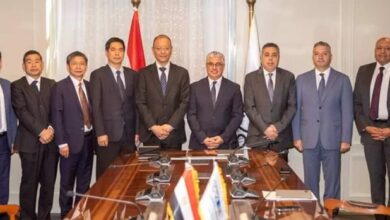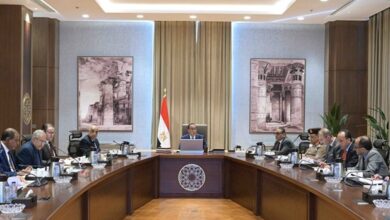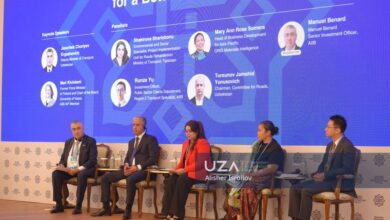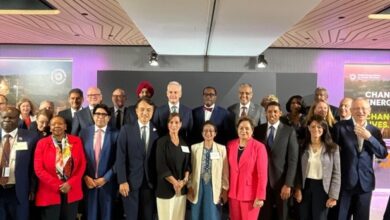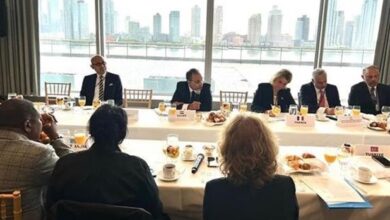Business
Minister of International Cooperation Meets the WBG Regional Director for Equitable Growth, Finance and Institutions to Discuss 2023-2027 Country Partnership Framework (CPF) & Private Sector Engagement
By:Amal Elwy

The Minister of International Cooperation H.E. Dr. Rania A. Al Mashat met with the World Bank Group (WBG) Regional Director for Equitable Growth, Finance and Institutions Nadir Mohammed to discuss efforts to stimulate the private sector and finalize the 2023-2027 Country Partnership Framework (CPF).
Within the framework of the Ministry’s meetings with multilateral and bilateral development partners on the development cooperation portfolio and future projects, Al-Mashat met with Mohammed and the WBG’s Country Director for Egypt, Yemen and Djibouti Marina Wes, along with a number of the bank’s officials and the Ministry of International Cooperation team, to discuss future development cooperation programs with the bank, and to stimulate green transformation, as well as private sector participation efforts in development through various mechanisms, and discuss preparations for the launch of the new CPF.
The Minister discussed the measures and efforts undertaken by the Government of Egypt to enhance resilience, green transformation and gender equality.
The meeting also touched upon mechanisms and tools to stimulate the private sector and stimulate the investment environment, thus enhancing productivity, as well as the report to be prepared between Egypt and the WBG on strengthening the role of the private sector in development and in improving the efficiency of investments, and monitoring macroeconomic policies and measures taken to drive mitigation and adaptation efforts from the consequences of climate change.
In the same context, Al-Mashat discussed developments in preparing the new 2023-2027 Country Partnership Framework (CPF) which will represent a new chapter of constructive cooperation between the government and the WBG.
The new CPF is prepared in the light of the main pillar and objectives of developing the working environment, enhancing the role of the private sector in development and job creation, promoting investment in human capital, strengthening cooperation in the areas of green transition, especially at the level of adaptation and mitigation projects of climate change, and enhancing efforts to achieve inclusive and sustainable growth, pointing out that the pillars of the strategy will be formulated through three priorities: governance, regional integration, and promotion of gender equality.
It is worth mentioning that the size of the ongoing development cooperation portfolio with the WBG comprises 14 projects worth approximately $7 billion, spread across several priority sectors, along with 23 technical support, advisory and capacity-building projects. This comes alongside joint efforts to enhance private sector participation in development through cooperation with the International Finance Corporation (IFC) and the Multilateral Investment Guarantee Agency (MIGA); both members of the WBG.
Within the framework of the Ministry’s meetings with multilateral and bilateral development partners on the development cooperation portfolio and future projects, Al-Mashat met with Mohammed and the WBG’s Country Director for Egypt, Yemen and Djibouti Marina Wes, along with a number of the bank’s officials and the Ministry of International Cooperation team, to discuss future development cooperation programs with the bank, and to stimulate green transformation, as well as private sector participation efforts in development through various mechanisms, and discuss preparations for the launch of the new CPF.
The Minister discussed the measures and efforts undertaken by the Government of Egypt to enhance resilience, green transformation and gender equality.
The meeting also touched upon mechanisms and tools to stimulate the private sector and stimulate the investment environment, thus enhancing productivity, as well as the report to be prepared between Egypt and the WBG on strengthening the role of the private sector in development and in improving the efficiency of investments, and monitoring macroeconomic policies and measures taken to drive mitigation and adaptation efforts from the consequences of climate change.
In the same context, Al-Mashat discussed developments in preparing the new 2023-2027 Country Partnership Framework (CPF) which will represent a new chapter of constructive cooperation between the government and the WBG.
The new CPF is prepared in the light of the main pillar and objectives of developing the working environment, enhancing the role of the private sector in development and job creation, promoting investment in human capital, strengthening cooperation in the areas of green transition, especially at the level of adaptation and mitigation projects of climate change, and enhancing efforts to achieve inclusive and sustainable growth, pointing out that the pillars of the strategy will be formulated through three priorities: governance, regional integration, and promotion of gender equality.
It is worth mentioning that the size of the ongoing development cooperation portfolio with the WBG comprises 14 projects worth approximately $7 billion, spread across several priority sectors, along with 23 technical support, advisory and capacity-building projects. This comes alongside joint efforts to enhance private sector participation in development through cooperation with the International Finance Corporation (IFC) and the Multilateral Investment Guarantee Agency (MIGA); both members of the WBG.




